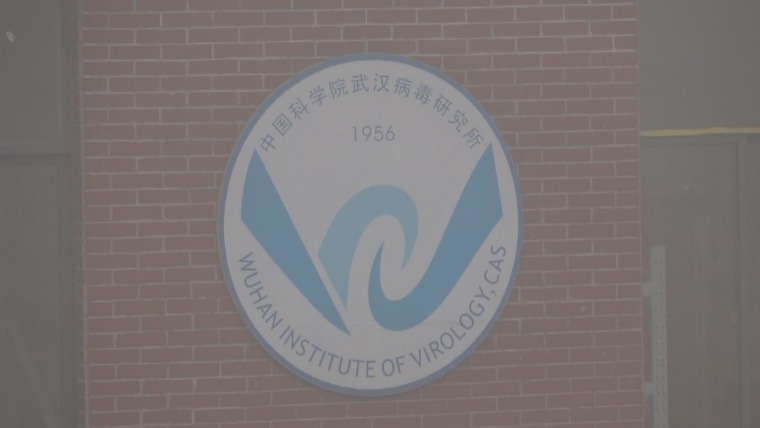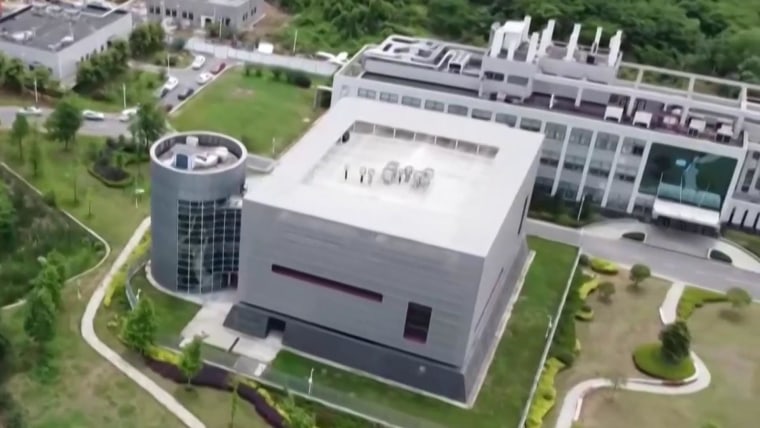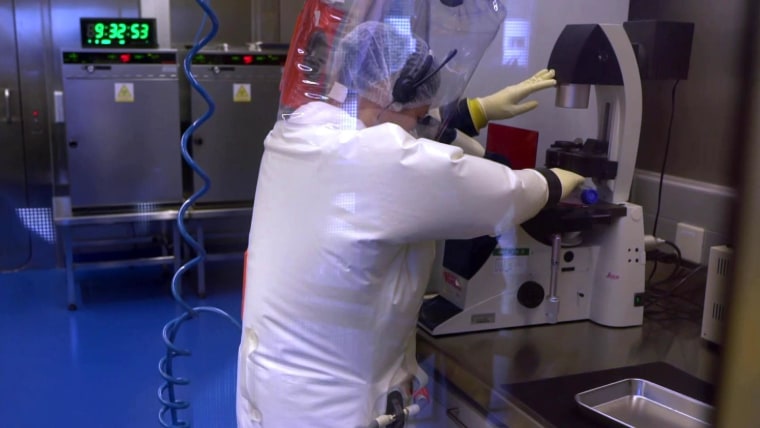WASHINGTON — Despite a finding by the World Health Organization that the Covid-19 outbreak in China most likely first infected humans through an animal host, the United States is still not ruling out the possibility of a laboratory accident, as officials continue to sort through intelligence about the Chinese government’s initial handling of the outbreak, American and Western officials told NBC News.
A spokesman for the Office of the Director of National Intelligence told NBC News the agency is standing by a public statement it issued in April, which said that that American intelligence agencies "will continue to rigorously examine emerging information and intelligence to determine whether the outbreak began through contact with infected animals or if it was the result of an accident at a laboratory in Wuhan."
Watch Keir Simmons on "NBC Nightly News" with Lester Holt tonight for more on this story.
U.S. officials have not made public any evidence pointing to a lab accident, and most scientists who have studied the matter said that such a scenario is unlikely. But Biden administration officials have faulted China in recent days for what they have termed a lack of transparency around the origins of the virus. And they have criticized how the WHO last week presented the initial findings of a visit to Wuhan, where the virus is believed to have emerged.
WHO investigators, after visiting three labs in Wuhan, said last week they found no signs that a lab accident could have caused the outbreak. One WHO researcher told reporters at a news conference the organization was halting any further inquiry into that theory.
But the director general of the WHO appeared to walk back that definitive statement a few days later, saying that "all hypotheses remain open and require further analysis and study."
A Western intelligence official who has seen classified material told NBC News the U.S. has substantial intelligence that has not been made public about actions the Chinese government took — related to the Wuhan lab and other issues — that were designed to obscure the origins of Covid-19 and conceal its early impact. A former U.S. official who has also seen the intelligence agreed that it was significant, if inconclusive.
Both sources said the material, which they did not detail, did not add up to evidence that a lab accident occurred. But they said it raised enough circumstantial questions that analysts have been unable to rule out the lab scenario. U.S. intelligence officials declined to comment.
The intelligence, which includes documents, paints a picture of a Chinese government initially trying to hide the burgeoning pandemic from the outside world.
"There is no doubt that, especially when Covid-19 first hit but even today, China is falling far short of the mark when it comes to providing the information necessary to the international community," Secretary of State Anthony Blinken told NBC's Andrea Mitchell this month. "All of the — that lack of transparency, that lack of being forthcoming, is a profound problem and it's one that continues."
The lab theory
The so-called lab theory refers to a hypothesis that the Covid outbreak emerged in Wuhan as a result of an accidental release from one of the labs working with coronaviruses in that city — perhaps from an improper disposal of lab waste or an employee who got infected at work and then infected others.
U.S. intelligence agencies and scientists say they have ruled out that Covid-19 was human-made or intentionally released. The lab theory hypothesizes an accidental release of a virus found in nature by researchers and brought in for study.
Scientists say that scenario is unlikely on its face, because animal-to-human transmission of viruses are common, while lab accidents are relatively rare. The key scientists studying viruses in Wuhan say they were not studying the Covid-19 virus, which had not been previously documented in nature before the outbreak.
Intelligence officials counter that one key lab, the Wuhan Institute of Virology, removed from public view a database of 22,000 virus samples for security reasons, and has not allowed a detailed look at the lab's notes or other records.
They say it's suspicious that the virus outbreak arose in Wuhan, a hub of virus research in China, while the bats that commonly carry coronaviruses are typically found in caves a thousand miles from that city.
They note that scientists also have not found a host animal that could have transferred the virus to humans, after a year of looking.
The Washington Post, in an editorial last week, called the lab leak theory "plausible," and said it "must be investigated."
The Wuhan Institute of Virology, "should provide all records regarding bat samples, viruses and sequences, with verified information provenance, and eventually, it should be disclosed to all," the editorial said. "The origin of the pandemic is of interest to every person on the globe."
WHO researchers acknowledged last week that the "wet" or live-animal market in Wuhan, which was originally thought to be a likely source of the outbreak, may not be the whole story, since early cases have been identified in people who had no connection to the market.
The WHO team included international and Chinese scientists. They say their summary report will be published within weeks.
One member of the team, Australian microbiologist and infectious diseases expert Dominic Dwyer, told NBC News that the scientists didn't get all the data they sought from the Chinese government, and that team members disagreed about various aspects of what they saw and heard.
"There were tense moments and disagreements and, you know, arguments about what things meant and so on, between both sides," Dwyer said. "And some of that is just because the data isn't strong enough to give a single, a great conclusion."
Dwyer says the team was given "aggregated data," as opposed to detailed, line-by-line case information, for the 174 known Covid cases from Wuhan in December.
Case information would enable researchers, he said, to "go along to a person who had this disease and say, OK, you know, how old are you? You know, what sort of work do you do? Who's in your family? What do you do for your hobbies? You know, do you go to the market? What sort of market do you go to, you know, what's your general health, like, all of those sorts of things to try and understand where a person had been, and where they could have been exposed to something."
Several members of the WHO team told NBC News they were provided with just 13 DNA sequences from the 174 cases. Of those, five had small genomic differences, suggesting a wider pool of virus, Dwyer said, though the sample was so small it was hard to draw conclusions.
"Actual infections is probably much higher than the 174," Dwyer said.
WHO investigators tasked Chinese researchers with surveying the wider community, he added.
According to Dwyer, the Chinese researchers said they examined the cases of 76,000 people presenting with fever or pneumonia from Oct. 1 to Dec. 31, 2019, and found 92 people with Covid-like symptoms. Of these, they tested 67 people, Dwyer said, and found no Covid-19 antibodies.
Those tests were carried out in January 2021, more than a year after the potential exposure. Scientists don't yet know how long Covid-19 antibodies remain in the body after infection.
Pompeo and the lab theory
The Trump administration, and in particular, then-Secretary of State Mike Pompeo, repeatedly said there was significant evidence in support of the lab theory.
On Jan. 15, five days before the end of the Trump administration, the State Department published a "fact sheet" making a series of allegations about the Wuhan Institute of Virology laboratory.
Among them: "The U.S. government has reason to believe that several researchers inside the WIV became sick in autumn 2019, before the first identified case of the outbreak, with symptoms consistent with both COVID-19 and common seasonal illnesses. This raises questions about the credibility of WIV senior researcher Shi Zhengli's public claim that there was 'zero infection' among the WIV's staff and students of SARS-CoV-2 or SARS-related viruses."
The fact sheet added, "Despite the WIV presenting itself as a civilian institution, the United States has determined that the WIV has collaborated on publications and secret projects with China's military. The WIV has engaged in classified research, including laboratory animal experiments, on behalf of the Chinese military since at least 2017."
One former official familiar with the intelligence on which Pompeo's statement is based said it was less than rock solid, and that some officials were surprised that the secretary aired it publicly. Pompeo did not respond to requests for comment made through his spokesman.
Dwyer told NBC News the WHO team inquired about the testing of researchers at the WIV lab and was told that there were standard tests of all staff in April 2019 and then again in 2020. They were told those tests were negative. But it's not clear when the 2020 tests were carried out, again raising questions about whether Coronavirus would be detected. The head of the Wuhan Institute of Virology Dr. Shi wrote on July 31, nine months after October 2019, that she "recently" tested all WIV employees and they were negative.
"I think the jury's still out," State Department spokesman Ned Price said last week about the origins of Covid-19. "Clearly the Chinese, at least heretofore, have not offered the requisite transparency that we need."
"still" - Google News
February 17, 2021 at 05:18AM
https://ift.tt/3tZqc13
U.S. still hasn't ruled out lab accident origin for Covid because China hasn't been transparent - NBC News
"still" - Google News
https://ift.tt/35pEmfO
https://ift.tt/2YsogAP
Bagikan Berita Ini

















0 Response to "U.S. still hasn't ruled out lab accident origin for Covid because China hasn't been transparent - NBC News"
Post a Comment